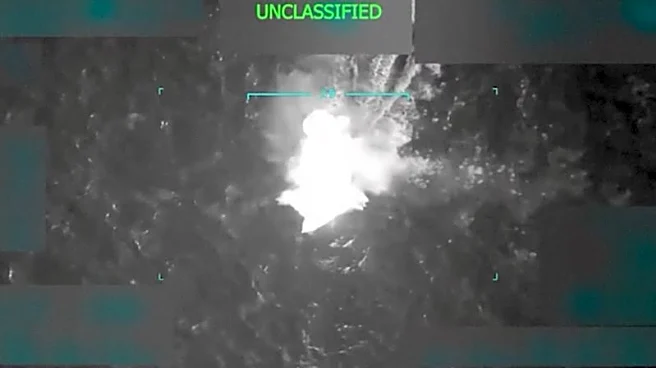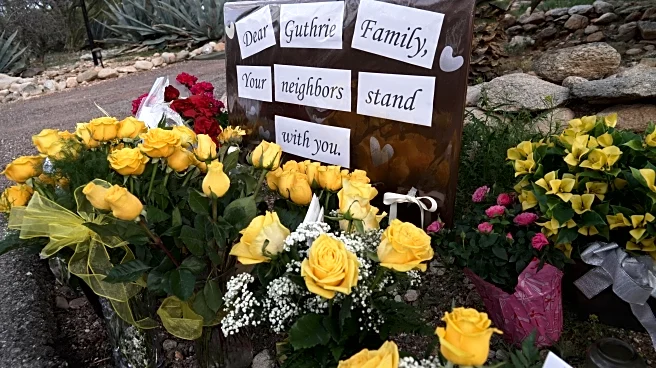By Tom Hals
WILMINGTON, Delaware (Reuters) -The U.S. military killed 11 people aboard a vessel in the Caribbean on Tuesday that President Donald Trump said was carrying illegal narcotics and that belonged
to a drug cartel he designated a terrorist organization responsible for murders in the United States.
Below is a look at the legal authority for the attack.
PRESIDENTIAL POWER TO USE THE MILITARY
Under the Constitution, the power to declare war belongs to Congress, but the president is the commander-in-chief of the armed forces and presidents of both parties have conducted military strikes overseas without congressional approval.
Presidents have justified military force in limited actions abroad when it was in the national interest, wasn't restricted by Congress and didn't rise to the level of war, according to a memo by the Office of Legal Counsel, which provides advice to the president.
WAS THE ATTACK LEGAL UNDER US LAW?
Presidents have generally ordered attacks on enemy combatants, terrorist groups like al Qaeda or militants such as the Houthis in Yemen, who attacked U.S. shipping.
Tuesday's attack marks a departure in the use of the military. Trump said in a social media post that the boat was transporting illegal narcotics, which would normally be the responsibility of the U.S. Coast Guard to intercept. If the Coast Guard had been fired upon when trying to stop the boat, the Coast Guard members would be justified in defending themselves, legal experts said.
However, Trump posted a video to social media that appeared to show a speeding boat being destroyed by an air strike.
The administration did not provide any evidence that the United States was under imminent threat of attack, that the vessel was armed and did not identify targets on the boat who were critical to a terror attack, as past presidents have done in similar attacks. The Tren de Aragua drug cartel that Trump said was operating the boat is not actively at war with the United States in the same way as other terror groups, like al Qaeda.
In the eyes of many people around the world, those on the boat were civilians and the attack will be seen as an extrajudicial killing, said legal experts.
WHAT ABOUT INTERNATIONAL LAW?
The Charter of the United Nations states that in the pursuit of international peace and security, members are to refrain from threatening or using force against other countries. The charter also recognizes the right of member states to self-defense.
The United States can argue it was taking "anticipatory" self-defense action and Trump said Tren de Aragua was under the control of Venezuela's president, Nicolas Maduro.
However, that falls short of international law without evidence of an imminent attack or past attacks by Tren de Aragua, according to legal experts.
Further, Venezuelan officials have disputed that the group is active in the country. Legal experts said the right of self-defense against non-state actors is a matter of debate in international law.
Trump administration officials said the vessel was in international waters, although if it had been a flagged vessel it would mean the attack was considered to have occurred on that country's territory. That would represent a potential major escalation. Administration officials have not said if the vessel was flagged.
WHO CAN CHALLENGE THE LEGALITY OF THE ATTACK?
Given that Venezuela's regime and Tren de Aragua are international pariahs, opponents of the attack may not want to challenge it.
However, that might change if more attacks are carried out, as Pentagon officials have said.
Legal challenges in U.S. courts against the president's authority to carry out the strike will likely face steep hurdles. U.S. courts generally defer to the president on matters of foreign relations and security.
Victims families could try to bring a civil case for damages against the administration in the United States, although it would require years of potentially costly litigation.
Such attacks do carry the legal risk that the administration will kill an American citizen. The administration of President Barack Obama said it had the authority to kill a U.S.-born al Qaeda militant, Anwar al-Awlaki, because he was the "operational leader" of an "enemy force" who posed a continued imminent threat. The deadly drone strike led to U.S. litigation.
The attack could be challenged in an international tribunal, such as the Inter-American Court of Human Rights, which has led to some countries acknowledging past abuses although the United States is not a party to the court.
While the attack might not lead to successful legal challenges, it could sour U.S. international relations and make it more difficult for Washington to partner with other countries on drug and immigration policies, legal experts said.
(Reporting by Tom Hals in Wilmington; Editing by Amy Stevens and Nick Zieminski)











